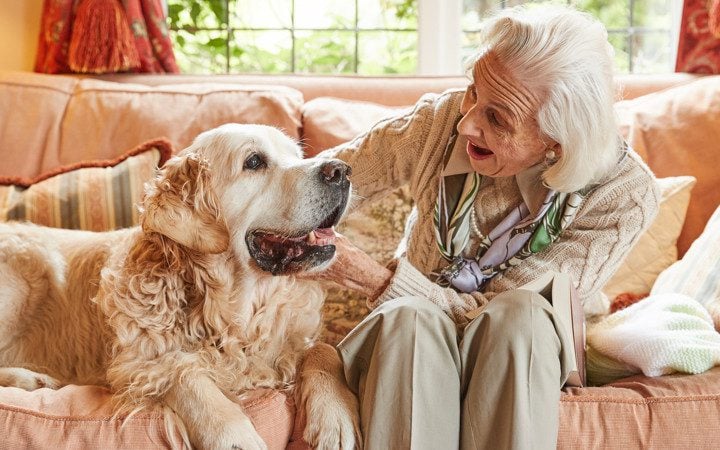Live-in care – can it help the elderly look after their pets?
Tags
Live-in care
Most of us will acknowledge what a great addition a much-loved pet is to our household and the multiple benefits they bring, particularly to older people. However, if you have an elderly relative who is starting to struggle with caring for their pet, you may be wondering what resources there are that may be able to help take the strain.
Separation
One of the things that many older people find most upsetting when moving into a care home is the fact that they are often not allowed to bring their dog, cat or other beloved pet with them.
In fact, losing or giving up a beloved pet can have a significant impact on mental health and wellbeing. A 2020 study found that women over the age of 55 experienced catastrophic grief after losing an animal companion, while the New England Journal of Medicine has even reported that a 61 year old women started experiencing chest pains after losing her dog.
Choosing an at-home care package, means older people can stay in the familiar surroundings of their own home with their pet, with a dedicated live-in carer 24-hours a day.
Multiple benefits
Most people accept that the positives of caring for a pet outweigh any negatives, particularly for older people. Owning a cat or dog, or indeed any animal that is dependent on human care, brings with it multiple benefits, including lower blood pressure, less stress and anxiety, higher levels of social interaction, a greater opportunity to stay active and an overall sense of being needed.
Quality of life
On top of these, owning a pet can also boost the older person’s quality of life, by helping them overcome feelings of loneliness, and it can raise their self-esteem. In the simplest terms, a dog or cat is someone to talk to and care for, at a stage in life when many older people may have suffered the loss of a spouse or feel the loneliness of an empty house.
Sense of purpose
Pets bring a real sense of purpose into the lives of elderly people, especially as they reach the time of life when they are becoming more dependent on help from family, friends or designated carers. Pets can be a valuable distraction from poor health and, in the case of a canine companion, can provide the person with the motivation they may need to get out and about, thereby sidestepping a decline into a more sedentary lifestyle.
More than just a ‘pet’
Often, a cat or dog may be as close to family as an older person has, especially if their loved ones live far away. If they shared their pet with a spouse who is no longer around, the pet can be much loved reminder and connection to that person. That is why it is so vital to keep in mind that the loss of a pet companion may be the hardest thing that someone has to bear when their care needs change.
Jeni Lennox and the Dementia Dog Project
For people living with dementia, a dog can become a lifeline – acting as a natural social connector when out and about, and providing unconditional love and companionship for both the person with dementia and their carer too. We talked to Dementia Dog Project’s project consultant Jeni Lennox, about the innovative initiative taking place in Scotland and the powerful impact it is having on those living with the daily realities of dementia.Care at home and animals
Many professional carers have experience in pet care, and are happy to help older people take care of their pets. This can include ensuring dogs get enough exercise if their owner is less mobile, supporting with tricky tasks like changing cat litter, moving heavy bags of food, and keeping on top of vet appointments. In fact, many vets will also make house calls on request if the client is elderly.
If an older person has recently lost a pet and is looking for a new animal companion, try and persuade them to go for an older animal. Puppies and kittens are adorable, but they can be a lot of work.
Puppies will need a lot of training to ensure they can safely interact with people and other animals. a lack of training can result in dogs pulling on their leads – causing severe injury to those with mobility issues or who lack the strength to control the dog. Other potential issues that can stem from a lack of training while young include snapping and biting behaviours, jumping up and knocking people off their feet, and going to the toilet in the house.
Meanwhile kittens have a lot of energy and will need a lot of entertainment while they’re little. They can also be prone to energy bursts in the evening and at night – when older people should be winding down in order to support a healthy sleep pattern. Kitten teeth and claws are also needle sharp, which can cause issues during play if an older loved one has poorer skin integrity, and cuts or bruises easily.

Other support services
If an older person is unable to walk their dog, hiring a professional dog walker can help. Before hiring a dog walker make sure they have valid insurance. there are three types of insurance to look our for – Public Liability, in case the dog causes an accident or injury – Care Custody and Control, in case the dog runs away – and Non-Negligent Cover, which providers cover if the dog gets hurt while in the walkers care.
It’s also important to know how many dogs the walker will have at any one time, as too many may raise concerns around how much care and attention they can provide to each. There’s no UK wide limit to the amount of dogs a walker can walk at once – the Control of Dogs Act 2010 put this decision in the hands of local authorities. While many councils particularly in London have set the limit to four dogs, it’s worth checking what the advice is in your local area.
Services such as Borrow my Doggy can also help with exercising an older person’s dog. It works by connecting dog owners to a trusted local dog lover who can commit to a set amount of hours each week. each ‘borrower’ pays a fee to use the service, is covered by the company’s insurance, and must provide valid contact and personal information before being allowed to borrow a pet.
Shop for pet supplies online
When it comes to shopping for pet supplies, it is a good idea to bulk-buy on the internet, and have heavy items such as dog food delivered straight to the door. This frees up time for your relative to spend with their elderly care companion, pursuing hobbies or visiting friends and family, rather than worrying about getting to the pet shop or supermarket.
Learn more about live-in care
Take a look at more Elder guides on the benefits of live-in care.

Live-in care – the questions you should ask
Live-in Care: The Questions You Need to Ask If you are looking into 24-hour care at home, you’ll likely want to carry out some research

How can home care help with learning disabilities?
How Can Live-in Home Care Help With Learning Disabilities? Learning disabilities come in many different forms, but they all have an impact on a

What is live-in care?
What is live-in care? If you’re looking at care options for a loved one but are uncomfortable with the idea of sending them into

How can live-in care help an older person with cancer?
How can live-in care help families look after an elderly relative with cancer? With age, comes an increased risk of developing cancer – and it

Live-in care Vs Other types of care
Live-in care Vs Other types of care If your loved one has reached a stage where they need assistance with many aspects of their

Seven things to do with your older loved ones in Manchester
Seven Things to do with your Ageing Parents in Manchester Whether your parents are still full of vitality and energy, or are more sedentary